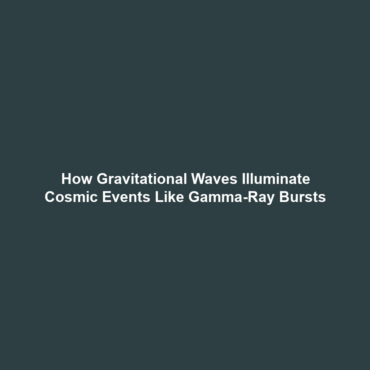How Gravitational Waves Help Locate and Understand Cosmic Events
Introduction
Gravitational waves have revolutionized our understanding of the cosmos, offering profound insights into the nature of celestial phenomena. Their detection not only validates Einstein’s theory of general relativity but also provides a powerful tool for locating and understanding cosmic events such as gamma-ray bursts (GRBs). These highly energetic explosions, which can outshine entire galaxies, signify some of the most violent processes in the universe. In this article, we explore how gravitational waves help locate and understand cosmic events and examine their significance within the broader context of gravitational waves.
Key Concepts
Understanding Gravitational Waves
Gravitational waves are ripples in spacetime caused by accelerating masses, such as colliding black holes or neutron stars. Significant concepts include:
- Detector Sensitivity: Advanced Laser Interferometer Gravitational-Wave Observatory (LIGO) and Virgo are pioneering facilities detecting these cosmic signals with remarkable precision.
- Waveform Analysis: Analyzing the waveform of detected gravitational waves helps astronomers discern the characteristics of the catastrophic events that generate them.
- Multi-Messenger Astronomy: Gravitational waves enable astronomers to gather information across different types of signals, paving the way for a more comprehensive understanding of cosmic events.
Applications and Real-World Uses
Gravitational waves play a crucial role in modern astrophysics, particularly in the study of gamma-ray bursts. Here are key applications:
- Detection of GRBs: The synergy between gravitational wave detectors and gamma-ray observatories such as Fermi and Swift has improved the localization of GRBs significantly.
- Understanding Neutron Star Collisions: Gravitational wave detections provide valuable insights into the aftermath of neutron star collisions, which are often associated with short GRBs.
- Illuminating Dark Matter and Energy: Insights derived from gravitational waves contribute to a broader understanding of cosmic phenomena, including dark matter and dark energy.
Current Challenges
Despite advancements, challenges remain in utilizing gravitational waves to study cosmic events:
- Signal Noise: The detection process is often hindered by environmental and instrumental noise, complicating data interpretation.
- Limited Detection Range: Current detectors have a finite range, which restricts the observable universe for gravitational waves.
- Complex Modeling: Accurate modeling of the waveforms from various cosmic events is essential yet challenging, due to the complexities involved in their dynamics.
Future Research and Innovations
Looking ahead, several innovations are anticipated to enhance our understanding of gravitational waves and cosmic events:
- Next-Generation Detectors: Projects such as LISA (Laser Interferometer Space Antenna) aim to provide unprecedented sensitivity and expand our reach into the universe.
- Real-Time Alerts: Developing systems to alert astronomers in real-time when gravitational waves are detected will allow for immediate observations of associated electromagnetic waves.
- Advanced Data Analysis Techniques: Machine learning and AI will significantly improve the efficiency of data interpretation, helping to uncover more cosmic secrets.
Conclusion
Gravitational waves are a cornerstone of contemporary astrophysical research, offering insights that illuminate the most enigmatic cosmic events like gamma-ray bursts. Through their detection, astronomers are not only expanding our understanding of the universe but also paving the way for future discoveries. As technology and methodologies advance, the potential for uncovering further cosmic phenomena continues to grow. For more information on gravitational waves and related topics, explore our extensive resources on gravitational waves and cosmic events.
